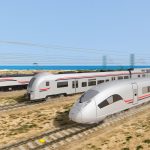 The Egyptian National Authority for Tunnels (NAT) signed with the consortium of Siemens Mobility, Orascom Construction and The Arab Contractors the contract to construct 2,000 km high-speed rail system in Egypt.
The Egyptian National Authority for Tunnels (NAT) signed with the consortium of Siemens Mobility, Orascom Construction and The Arab Contractors the contract to construct 2,000 km high-speed rail system in Egypt.
Siemens Mobility share of the combined contract is EUR 8.1 billion and includes the initial contract of EUR 2.7 billion for the first line signed in September 2021.
The contract was signed by Lieutenant General Kamel Al Wazir, the Minister of Transport Egypt, and Roland Busch, the CEO of Siemens AG, as well as Osama Bishai, CEO Orascom Construction and Sayed Farouk, President of Arab Contractors.
The signing ceremony was attended by Abdel Fattah El-Sisi, the President of Egypt, Mostafa Madbouly, the Prime Minister, Essam Wally, Chairman of NAT, Frank Hartmann, German Ambassador, as well as Michael Peter, Siemens Mobility CEO.
Together with civil works partners Orascom Construction and The Arab Contractors, Siemens Mobility will provide its comprehensive turnkey services to design, install, commission, and maintain the entire system for 15 years.
“The new electrified train network comes as a consolidation of the fruitful cooperation between Egypt and Germany in the field of infrastructure and will represent a valuable great addition to Egypt’s transport system, marking the beginning of a new era for the railways system in Egypt, Africa, and the Middle East,” the Egyptian President said.
The Egyptian high-speed network will consist of three lines. The first one, the 600-km Suez Canal on rails, connecting the port cities of Ain Sokhna on the Red Sea to Marsa Matrouh and Alexandria on the Mediterranean. The contract signed in May 28 also includes two more high-speed lines, with a 1,100 km line running between Cairo and Abu Simbel near the Sudan border, linking the mega city to rising economic centers in the south and will also allow for the development of communities up and down the Nile. The third line will cover 225 km connecting the world heritage archeological sites in Luxor with Hurghada by the Red Sea. In addition, this rail link will significantly improve the efficiency and sustainability of freight transport for goods and materials between Safaga harbor and inland locations.
Under the contract, Siemens Mobility will deliver 41 8-car Velaro high-speed trains, 94 4-car Desiro high-capacity regional train sets and 41 Vectron freight locomotives.
On all three lines, Siemens Mobility will install a safe and reliable signaling system based on the ETCS Level 2 technology, as well as the power supply system that will deliver efficient and continuous energy.
Siemens Mobility will also provide its latest digital products and platforms that will optimise operations throughout the network for the trains, rail infrastructure and subsystems. The digital application Railigent will be used to provide comprehensive asset management and maintenance to guarantee the highest availability. Digitalised depots will enable seamless processes from problem identification to correction. Automated ticketing, digital station and power management solutions will help to meet the challenges surrounding capacity and efficiency in stations.
The state-of-the-art high-speed rail network will connect 60 cities throughout the country, with trains that can operate at up to 230 km/h. By constructing the new high-speed lines, 90 percent of Egyptians will have access to this modern, safe, and integrated rail system and will enable around 500 million journeys a year.
The high-speed rail system in Egypt will significantly shift road transport towards railways cutting the carbon emissions by 70 percent compared to current car or bus transport.
“The opportunity to provide Egypt with a modern, safe, and affordable transport system that will transform the everyday for millions of Egyptians, create thousands of local jobs and reduces CO2 emissions in transport, is an honor for us. Not only will it promote economic growth, it will also enable Egypt to take a leap forward in rail transport,” Roland Busch said.
Share on:






